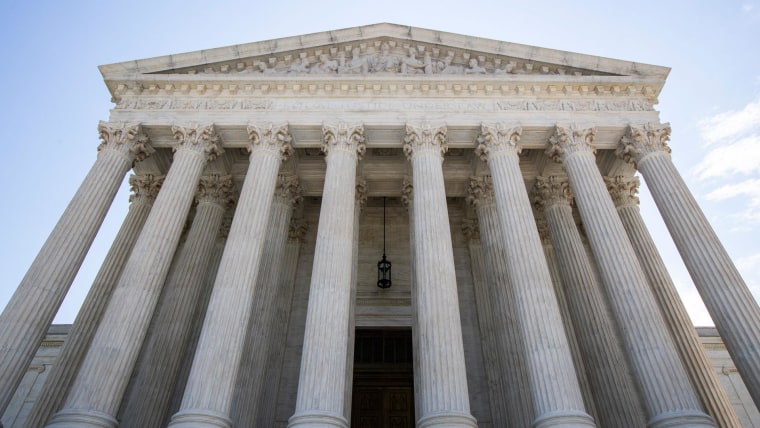WASHINGTON — The Supreme Court on Tuesday will consider whether the city of Boston was wrong when it refused to let an organization fly a Christian flag in front of City Hall.
The case invites the court to decide whether the flagpole conveys a government message or whether it’s a forum open to all comers. Boston says the flagpole is an expression of the city’s views, and therefore letting the Christian flag fly would amount to an unconstitutional government endorsement of religion.
But Boston’s legal position is opposed by the Biden administration and the American Civil Liberties Union. They say the city cannot censor a religious message in what amounts to a public forum.
June 30, 202002:32
Under previous Supreme Court rulings, if the flagpole is considered government speech, then the city can say, or decline to say, whatever it wants. But if the flagpole is deemed a public forum, the government can’t choose which messages to allow and which to ban.
Three flagpoles stand in front of the city hall, two for the flags of the United States and the state of Massachusetts. On the third, Boston’s city flag is normally raised, but the city makes it available for private organizations that conduct commemorations in the plaza in front of the building.
The case involves a request from Harold Shurtleff, founder of Camp Constitution, which says part of its mission “is to enhance understanding of the country’s Judeo-Christian heritage.” When he sought permission to fly what he described as “a Christian flag” — a cross in a blue square on a white field — the city turned him down.
He sued, but two lower courts ruled for the city.
“The flagpole that stands prominently at the city’s seat of government is the means by which the city communicates its own messages,” Boston’s lawyers told the Supreme Court. The city uses it as a bully pulpit and has not turned it over “to private parties as a forum to pronounce their own messages.”
But lawyers for Shurtleff said it cannot be considered an outlet for government messages because the city exercises virtually no control over who can use it. In the 12 years before Camp Constitution’s request, they point out, the city approved 284 flag-raising events with no record of any denials — until his.
They said the pole amounts to a public forum, where restrictions based on the content or viewpoint of a message are unconstitutional.
The ACLU, in a friend of the court brief, agreed. By denying access to a forum to persons expressing religious viewpoints, the city is regulating private speech, not crafting government speech, it said.
“Government entities often require private parties to obtain permits before accessing public forums, and the mere fact that a government imposes such a requirement does not transform private expression into government speech,” it said.
The Anti-Defamation League sided with the city, saying a ruling against Boston could force the city to allow extremist or anti-Semitic messages.
“The value to such groups of the ‘photo op’ of a Nazi flag, the Confederate flag, or some other white supremacist banner flying over Boston City Hall should not be underestimated,” it said.
The Supreme Court’s rulings on government speech and endorsement of religion have been something of a tangle. It has said it’s unconstitutional to post the Ten Commandments in a local courthouse but not to put up a monument bearing the biblical principles in a park that has other monuments.
It has also said that the slogans on license plates are government speech and that states can therefore restrict the messages they bear. But it has ruled that the federal government’s grant of trademark protection is not government speech, so federal regulators can’t refuse to grant trademarks to offensive brand names.
The court will issue its decision in the Boston case by late June.



